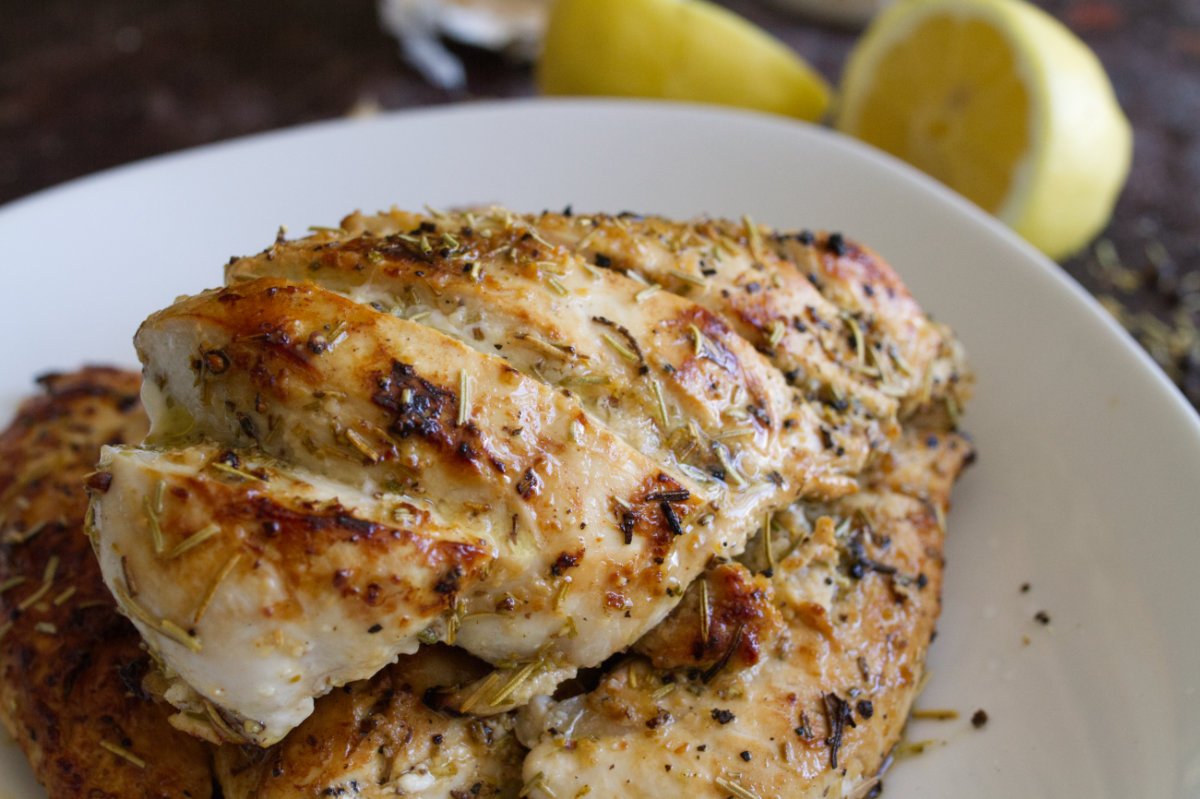30-seconds Prep | Chicken Recipe
This easy 5-Ingredient Mediterranean Chicken Marinade is exactly what you’re looking for come time to fire up the grill or BBQ! This has quickly become my go-to chicken marinade this summer. As the name suggests, it uses just 5 easy-to-find ingredients: Olive oil, lemon juice, garlic, rosemary, and seasoning, plus it only takes half a minute to prepare.
This recipe uses the 3:1 ratio of oil to acid to create the perfect balance of ingredients, ensuring proper marination. It is ideal for BBQ season and once the chicken is marinated, it can be cooked on the grill, in a skillet, or oven-roasted (I opted for the skillet cooking version for this video).
Table of contents:
Why you’ll love this recipe
- Easy to make, literally 30-seconds of prep work
- One pan Chicken recipe
- Delicious Mediterranean flavors
- Great weeknight dinner option
- Suitable for meal prepping or batch cooking
- Freezable
How to Make This Super Easy 5-Ingredient Mediterranean Chicken Marinade
Ingredients
For the marinade:
- 3 tablespoons of Extra Virgin Olive Oil
- 1 lemon, juiced
- 1 tsp Garlic Powder (or 2 garlic cloves, minced)
- 1 tsp of Dried Rosemary
- Salt and pepper (to taste)
For the Chicken:
- 17oz. (500g) of chicken breast meat (around 2 breasts)
Optional ingredients:
- 2 tablespoons freshly chopped parsley
1 teaspoon smoked paprika (we prefer to use Spanish La Vera Smoked Paprika)
Equipment Needed
- Large Glass bowl (for mix/making salads)
- Sharp Chef Knife and cutting board
- Fork or Cooking tongs
- Plastic Food Wrap
- Cast Iron Skillet (For cooking the chicken)
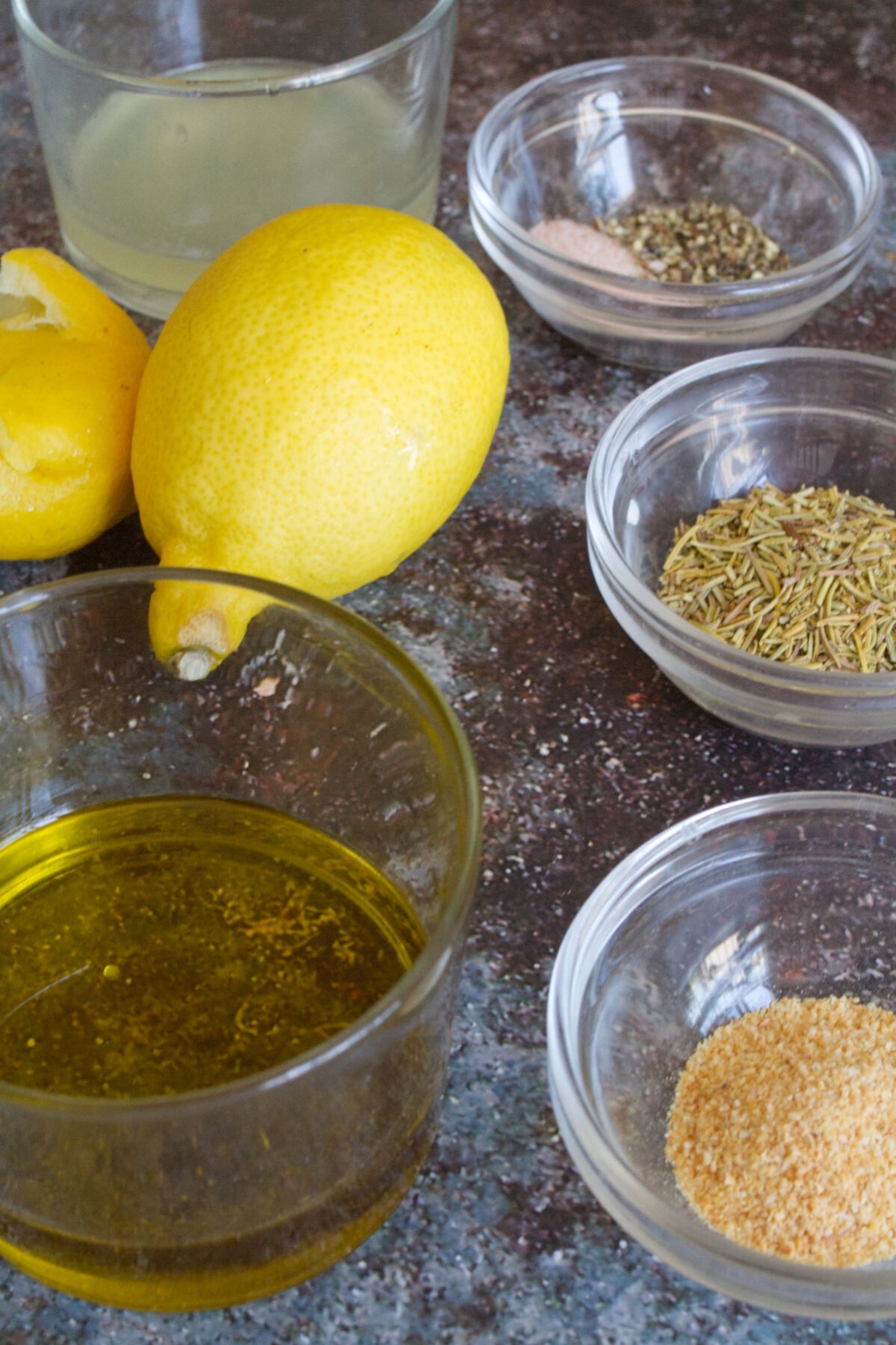
Instructions
Step 1 – Prepare Marinade
- Add the olive oil, juice from 1 lemon, garlic powder, dried rosemary, and seasoning to a large bowl. Mix with a fork to combine ingredients.
Step 2 – Prepare and Marinate Chicken
- Score the tops of the breast meat with slices around half an inch (1cm) deep, and one inch (2.5cm) apart (this helps the chicken absorb more of the marinade and cook faster).
- Add scored chicken breasts to the marinade and coat evenly.
- Cover bowl/dish with kitchen wrap and refrigerate for at least 15 minutes (the longer the better – See notes in the article on ideal marinating time for chicken breast meat).
Step 3 – Cook Chicken
Skillet or grill method – Cook time around 8-10 minutes
- Heat a large skillet on medium-high heat. Once hot, add a spoonful of the marinade (it should sizzle when it hits the pan) and then add the chicken. Cook chicken for 4-5 minutes per side or until golden.
- The chicken is done when it reaches an internal temperature of 165°F (74°C) when using a meat thermometer.
(Optional) Oven roasted method – Cook time around 20-25 minutes
Preheat oven to 200°C/400°F
- Add chicken breast meat to an oven tray and drizzle with any remaining marinade from the bowl.
- Bake for 20-25 minutes or until you see the tops of the breast meat become golden.
- The chicken is done when it reaches an internal temperature of 165°F (74°C) when using a meat thermometer.
Cooking Notes:
- Use a 3:1 ratio of oil to acid as it balances flavors and ensures proper marination.
- Use good quality olive oil (in particular extra virgin olive oil) for best results.
- Use freshly squeezed lemon juice, not constituted lemon juice.
- Today I used skinless chicken breast for this recipe. But chicken thigh or any other cut of chicken also works just fine.
- Chicken breast marinating times: Quick (15 minutes to 30 minutes), standard (2 to 4 hours), extended (8 to 12 hours).
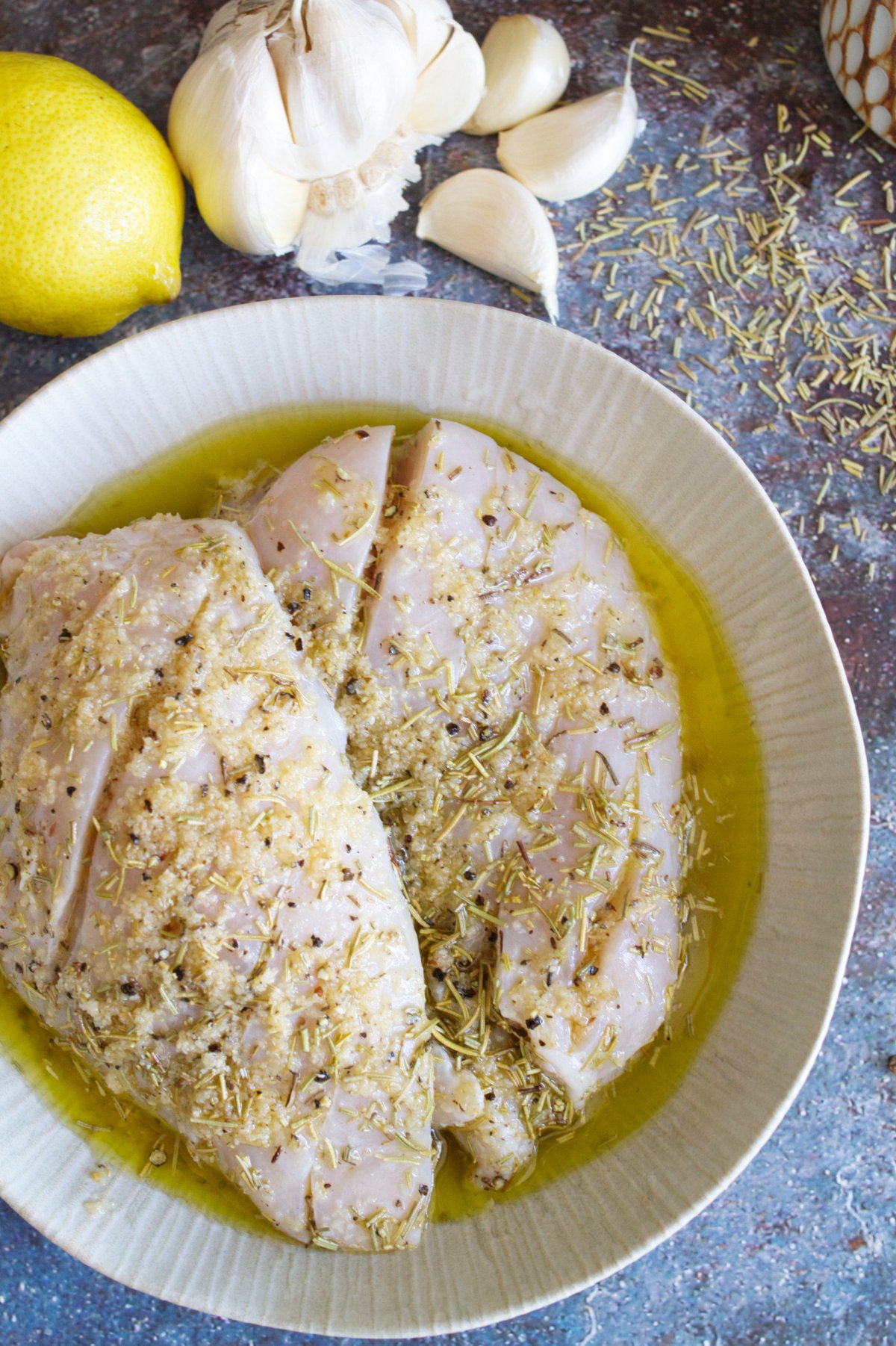
Ingredients and Substitutions
This recipe is delightfully simple and works incredibly well with just 5 ingredients: olive oil, lemon juice, garlic, rosemary, and a little seasoning. All of these ingredients should be easy to find in any supermarket or food store and are not expensive to buy.
Here’s what I use to create this super easy Mediterranean-style chicken marinade and why I like to make this so often (short answer: delicious, healthy, easy, and quick).
Olive oil
I use extra virgin olive oil for its rich flavor characteristics and well-documented health benefits. Use the best quality olive oil you can find, if possible (I totally get that prices have sky-rocketed of late and is more expensive in some countries so use plain olive oil if you like too). Italian, Greek, or Spanish olive oils are considered some of the best olive oils in the world. But there are plenty of great olive oils coming from outside of the Mediterranean these days too, so pick your favorite.
Lemon Juice
Using freshly squeezed lemon juice when making a marinade is so much better because:
- Freshly squeezed lemon juice has a bright, vibrant flavor that bottled juice often lacks.
- Freshly squeezed lemon juice is free from preservatives, artificial flavors, and stabilizers that are commonly found in bottled juices. These additives can alter the taste and quality of your marinade.
- The acidity of fresh lemon juice is consistent and natural, whereas bottled lemon juice might have added citric acid to standardize its pH, which can sometimes result in an overly harsh or artificial taste.
- When you squeeze fresh lemons, the oils from the peel are often incorporated into the juice, adding a fragrant, aromatic component to the marinade that enhances the overall sensory experience.
Win-win-win-win!
Garlic
A staple ingredient in many Mediterranean dishes, garlic is used to enhance flavor and provide an extra kick. I normally use 1 teaspoon of garlic powder for this chicken marinade. But you can use fresh garlic too, and for this recipe I usually add around 2 minced cloves of garlic when I go fresh.
Rosemary
Another staple herb in Mediterranean cooking is rosemary. I use 1 tablespoon of dried rosemary for this recipe. If you prefer, fresh rosemary can also be used. Note that you’ll need to use more fresh rosemary as dried rosemary is more intense.
Not a fan of rosemary? Substitute it with dried oregano, thyme, dried cilantro, or even fresh parsley.
Seasoning
I like to use a liberal amount of salt and freshly cracked black pepper to season the chicken marinade. Season to taste, for me that’s around 1 leveled teaspoon of pink Himalayan salt and around ½ teaspoon of cracked black pepper for seasoning.
Optional Ingredients
Paprika and Cumin
If you are looking to add some additional flavor and richness to your marinade, try adding some Spanish paprika or ground cumin to the marinade. 1 leveled teaspoon max of each will be sufficient.
Fresh Parsley Another great way to add a flavor pop and some color is to incorporate some freshly chopped parsley into the marinade. Add this at the same time you would add the other herbs and spices.
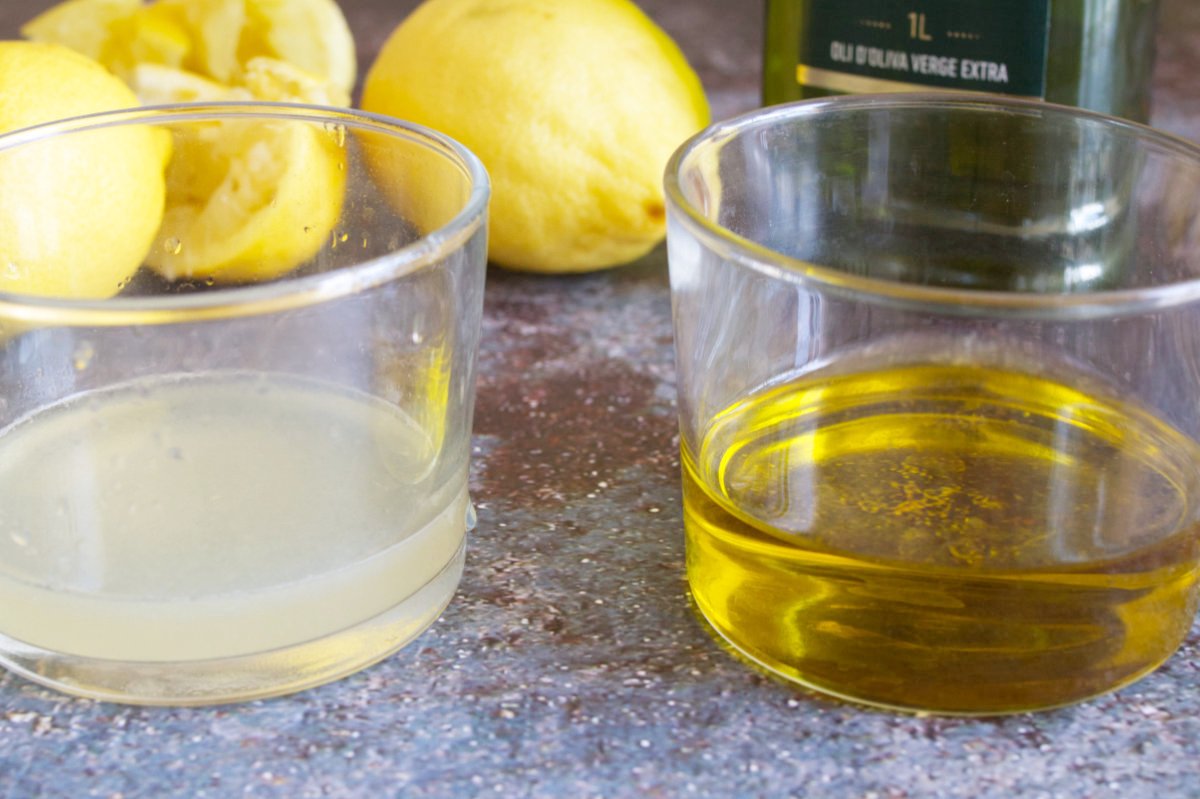
Marinades
The beauty of marinades is how diverse they can be and creative. But there are some simple truths that hold true across the board.
What is the Oil-To-Acid Ratio With Marinades?
The oil-to-acid ratio is a critical element in marinades and cooking as it balances flavors and ensures proper marination. The general guideline for most marinades and vinaigrettes is a 3:1 ratio of oil to acid. Here’s a detailed breakdown of how this ratio works in different contexts:
Marinades
For marinades, the oil-to-acid ratio helps to achieve the following:
- Tenderize: The acid (vinegar, citrus juice, wine, etc.) helps to break down proteins in meat, making it more tender. This recipe uses freshly squeezed lemon juice for this component of the ratio.
- Flavor: The oil carries fat-soluble flavors and helps distribute the acidic components more evenly. I use extra virgin olive oil for its strong flavor and renowned health benefits.
Adjustments
Depending on personal taste or specific recipes, this ratio can be adjusted. You may prefer a sharper, more acidic flavor and might use a 2:1 ratio or even equal parts oil and acid. Conversely, if you prefer a more mild, less acidic flavor you might use a 4:1 ratio.
Additional Ingredients
Often, other ingredients are added to marinades and vinaigrettes to enhance flavor, such as:
- Sweeteners: Honey, sugar, or maple syrup to balance the acidity.
Herbs and Spices: Mustard and different types of fresh herbs for additional flavor.
Practical Tips
- Taste and Adjust: Always taste the marinade and adjust the ratio or add more seasonings as needed.
Marination Time: For marinades, longer marination (several hours to overnight) allows flavors to penetrate more deeply, but too much acid can make the meat mushy if left too long.
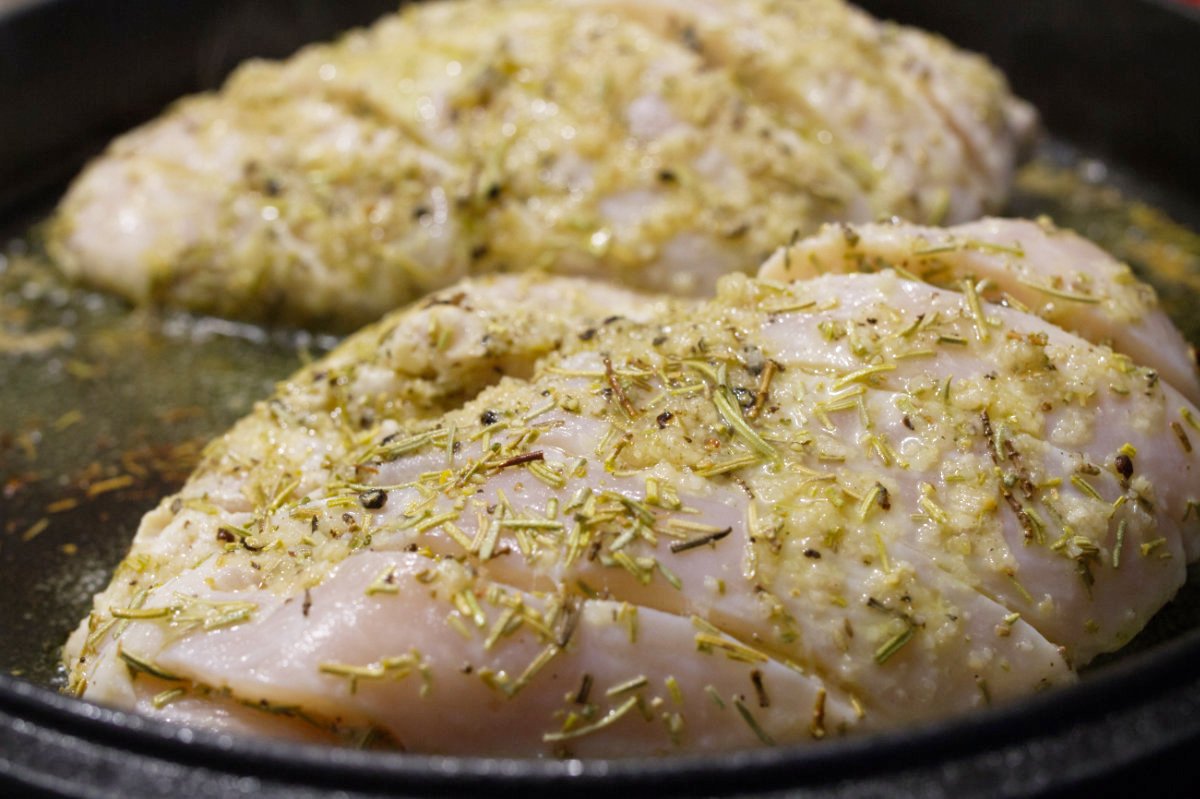
Best Chicken Cut to Use for Marinating?
This really depends on the dish you’re preparing and personal preferences. I use different cuts of chicken depending on the dish, my mood, and even the weather! Since this marinade is simple with just 5 ingredients it pairs well with many options but today I used skinless chicken breasts (it’s summer and the healthy vibes are in), but this chicken marinade works with any cut of chicken.
Here are some popular choices and their benefits:
1. Chicken Thighs
- Benefits:
- More flavorful and juicier compared to breast meat.
- Higher fat content allows them to stay moist and tender during cooking.
- Absorbs marinades well, enhancing the overall taste.
- Often cheaper, in many countries.
- Ideal For: Grilling, roasting, and slow cooking.
2. Chicken Breasts
- Benefits:
- Leaner than thighs, which can be a healthier option.
- Versatile and can be used in a variety of dishes.
- Can be pounded to an even thickness for more uniform marinating and cooking.
- Ideal For: Grilling, baking, stir-frying, and slicing for salads or sandwiches.
3. Chicken Drumsticks
- Benefits:
- Flavorful and fun to eat (but can be messy!).
- The bone-in nature helps retain moisture.
- Ideal for casual meals and gatherings.
- Ideal For: Grilling, roasting, and slow cooking.
4. Chicken Wings
- Benefits:
- Perfect for appetizers and snacks.
- Absorbs marinades very well due to the high skin-to-meat ratio.
- Ideal For: Grilling, baking, and frying.
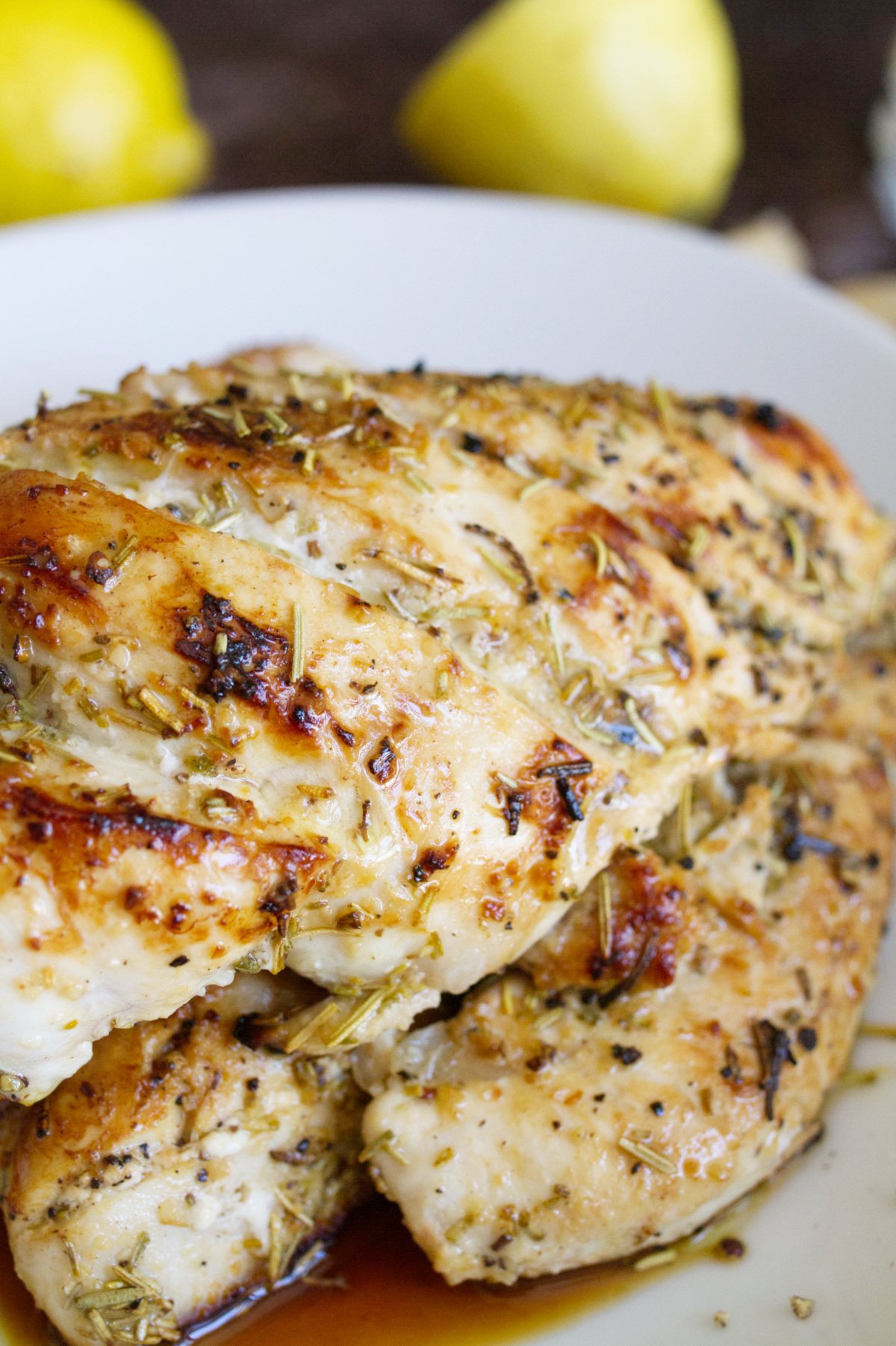
How Long to Marinate Chicken Breasts?
The optimal marination time for chicken breasts can vary depending on the marinade ingredients and the desired flavor intensity. Here are some general guidelines:
Basic Marination Times
- Quick Marination:
- 15 to 30 minutes: If you are short on time, even a quick marination can impart some flavor and moisture to the chicken breasts. This is suitable for marinades that are primarily based on oil and herbs or mild acids like yogurt or buttermilk.
- Standard Marination:
- 2 to 4 hours: This is the most common marination time for chicken breasts. It allows enough time for the flavors to penetrate the meat without risking a change in texture. Marinades with a moderate amount of acid like this recipe (vinegar, lemon juice, wine) are suitable for this duration.
- Extended Marination:
- Overnight (8 to 12 hours): For maximum flavor absorption, marinating chicken breasts overnight is ideal. This is particularly useful for thicker cuts of chicken. However, be cautious with highly acidic marinades (containing lots of citrus or vinegar), as prolonged exposure can break down the proteins too much, resulting in a mushy texture.
Special Considerations
- Highly Acidic Marinades: If your marinade has a high acid content (e.g., lots of lemon juice, lime juice, or vinegar), limit marination to a maximum of 2 to 4 hours to avoid over-tenderizing the meat.
- Dairy-Based Marinades: Marinades that include dairy products like yogurt or buttermilk are gentler on the meat and can be used for longer periods, even overnight, without the risk of mushiness.
- Salt-Based Marinades: If using a brine or marinade with a high salt content, keep the marination time under 4 hours to prevent the meat from becoming too salty or overly tender.
Practical Tips
- Refrigeration: Always marinate chicken breasts in the refrigerator to prevent bacterial growth.
- Containers: Use a non-reactive container (glass, ceramic, or food-safe plastic) or a resealable plastic bag for marinating. Avoid using metal containers as they can react with the acidic ingredients.
Even Coating: Ensure the chicken breasts are evenly coated with the marinade. Turn them occasionally if using a shallow container and they’re not evenly covered.
Nutrition Facts
The nutrition facts noted below are based on the chicken marinade and include 500 grams (17oz.) of skinless chicken breast meat.
| Serving size: 125g | |
| Servings: 4 | |
| Amount per serving | |
| Calories | 239 |
| % Daily Value* | |
| Total Fat 13.8g | 18% |
| Saturated Fat 1.6g | 8% |
| Cholesterol 80mg | 27% |
| Sodium 64mg | 3% |
| Total Carbohydrate 1.4g | 1% |
| Dietary Fiber 0.4g | 2% |
| Total Sugars 0.6g | |
| Protein 26.7g | |
| Vitamin D 0mcg | 0% |
| Calcium 18mg | 1% |
| Iron 1mg | 4% |
| Potassium 483mg | 10% |
| *The % Daily Value (DV) tells you how much a nutrient in a food serving contributes to a daily diet. 2,000 calorie a day is used for general nutrition advice. | |
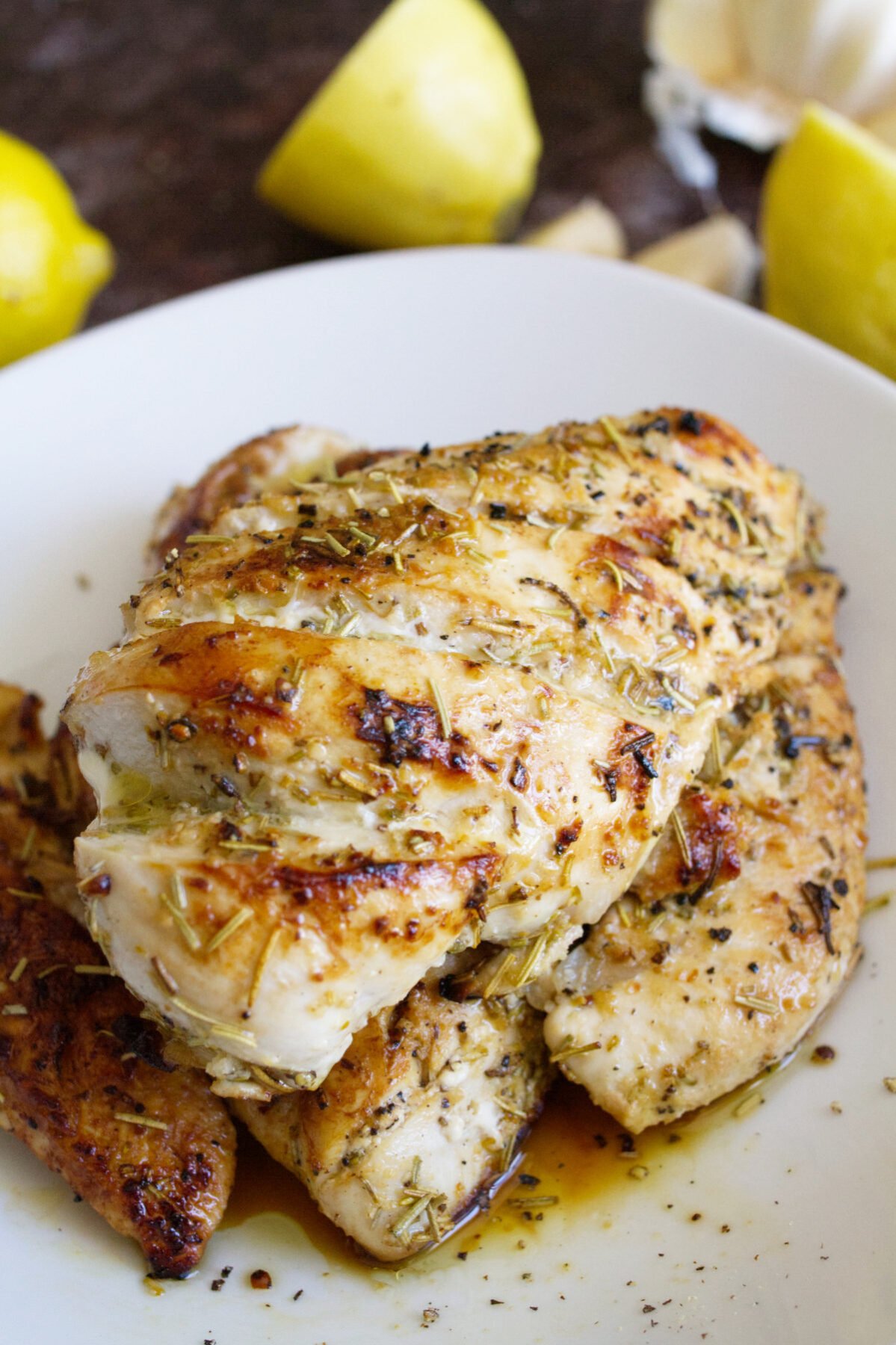
More Mediterranean Chicken Recipes:
- Healthy Mediterranean Chicken in a Tangy Lemon, Oil, and Herb Marinade
- Baked Mediterranean Chicken Thighs
- Pan-fried Greek Chicken Souvlaki With Creamy Tzatziki Sauce
- Za’atar Chicken with Leek, Artichoke Hearts, and Kalamata Olives
- One-pan Greek Chicken thighs with roast veg
- Mediterranean Chicken Meatballs with Couscous and a Tangy Greek Yogurt Dressing
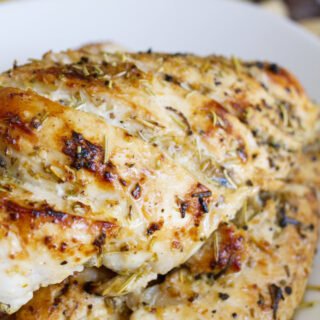
Easy 5-Ingredient Mediterranean Chicken Marinade!
Equipment
- 1 large glass bowl
- Sharp kitchen knife and cutting board
- Fork or cooking tongs
- Kitchen wrap
- 1 skillet (For cooking the chicken)
Ingredients
For the marinade:
- 3 tablespoons of Extra Virgin Olive Oil
- 1 lemon juiced
- 1 teaspoon garlic powder or 2 garlic cloves, minced
- 1 teaspoon of dried rosemary
- Salt and pepper to taste
For the Chicken:
- 17 oz. 500g of chicken breast meat (around 2 breasts)
Optional ingredients:
- 2 tablespoons freshly chopped parsley
- 1 teaspoon smoked paprika
Instructions
Step 1 – Prepare Marinade
- Add the olive oil, juice from 1 lemon, garlic powder, dried rosemary, and seasoning to a large bowl. Mix with a fork to combine ingredients.3 tablespoons of Extra Virgin Olive Oil, 1 lemon, 1 teaspoon garlic powder, 1 teaspoon of dried rosemary, Salt and pepper
Step 2 – Prepare and Marinate Chicken
- Score the tops of the breast meat with slices around half an inch (1cm) deep, and one inch (2.5cm) apart (this helps the chicken absorb more of the marinade and cook faster).17 oz. 500g of chicken breast meat (around 2 breasts)
- Add scored chicken breasts to the marinade and coat evenly.
- Cover bowl/dish with kitchen wrap and refrigerate for at least 15 minutes (the longer the better – See notes in the article on ideal marinating time for chicken breast meat).
Step 3 – Cook Chicken
- Skillet or grill method – Cook time around 8-10 minutes
- Heat a large skillet on medium-high heat. Once hot, add a spoonful of the marinade (it should sizzle when it hits the pan) and then add the chicken. Cook chicken for 4-5 minutes per side or until golden.
- The chicken is done when it reaches an internal temperature of 165°F (74°C) when using a meat thermometer.
Oven roasted method – Cook time around 20-25 minutes
- Preheat oven to 200°C/400°F
- Add chicken breast meat to an oven tray and drizzle with any remaining marinade from the bowl.
- Bake for 20-25 minutes or until you see the tops of the breast meat become golden.
- The chicken is done when it reaches an internal temperature of 165°F (74°C) when using a meat thermometer.2 tablespoons freshly chopped parsley, 1 teaspoon smoked paprika
Video
Notes
Cooking Tips
- Use a 3:1 ratio of oil to acid as it balances flavors and ensures proper marination.
- Use good quality olive oil (in particular extra virgin olive oil) for best results.
- Use freshly squeezed lemon juice, not constituted lemon juice.
- Today I used skinless chicken breast for this recipe. But chicken thigh or any other cut of chicken also works just fine.
- Chicken breast marinating times: Quick (15 minutes to 30 minutes), standard (2 to 4 hours), extended (8 to 12 hours).

